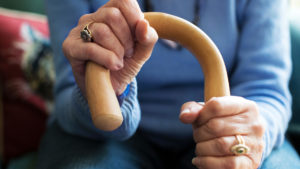Spotting the Signs and Protecting Oral Health in Vulnerable Adults
Recognising dental pain in individuals with dementia or those who are non-verbal can be a challenge, but it is a vital part of providing quality care. At Christies Care, we understand that dental health is an essential part of overall wellbeing.
Pain caused by dental issues can often go unnoticed in those who cannot communicate clearly, which is why it’s important for family members, carers, and healthcare professionals to stay alert to subtle signs.
Why Dental Pain Can Be Hard to Spot?
People living with dementia may struggle to identify or express that they are in pain. For those who are non-verbal, such as individuals with advanced dementia, learning disabilities, or certain neurological conditions, the only clues to their discomfort may be behavioural or physical.
These signs can be easily mistaken for symptoms of dementia itself, anxiety, or agitation, which can lead to untreated pain and worsening oral health.
Common Signs of Dental Pain in Non-Verbal or Dementia Patients
If you’re supporting someone who can’t tell you they’re in pain, look out for the following:
- Refusal to eat or drink, particularly hot or cold foods
- Pulling at the face or mouth, or rubbing the jaw
- Swelling around the face, mouth, or neck
- Sudden changes in behaviour, such as aggression or withdrawal
- Disrupted sleep or restlessness
- Grinding teeth or holding the jaw stiffly
- Bad breath or visible decay when assisting with oral hygiene
Why Oral Health is so Important
Good dental health is linked to many aspects of physical and emotional wellbeing. Infections, abscesses, and decay can lead to serious complications, especially for those with existing health conditions.
Poor oral hygiene can affect nutrition, cause weight loss, and significantly reduce quality of life. Ensuring regular mouth care and routine dental visits are part of any care plan is essential.
How Families and Carers Can Help
Families and professional carers play a key role in maintaining good oral health and identifying concerns early. Here’s how you can help:
Make Oral Hygiene a Daily Routine
Support gentle tooth brushing twice daily using fluoride toothpaste. If the person struggles with coordination, try adapted toothbrushes or mouth swabs.
Carry Out Visual Checks
During personal care, look for red or swollen gums, broken teeth, mouth ulcers, or anything unusual in the mouth. You don’t need to be a dental expert to notice that something seems “off.”
Monitor Behavioural Changes
Keep track of sudden changes in mood, eating habits, or sleep. A pattern of withdrawal or agitation may indicate ongoing pain that needs investigating.
Keep a Care Diary or Log
Log any signs of possible dental discomfort, especially if they’re recurring. This can be incredibly helpful for GPs and dentists when identifying the root cause of pain.
Encourage Regular Dental Check-Ups
For those receiving home care, mobile dentists or community dental services can be arranged if travel is difficult. Don’t wait until there’s a problem—preventative care is key.
Advocate
Non-verbal people rely on others to speak up on their behalf. If you believe there’s something wrong, trust your instincts and seek help. You know your loved one best.
When to Seek Professional Help
It’s important not to delay professional advice if you suspect dental issues. Contact a dentist, GP, or 111 (out of hours) if the person you care for is experiencing any of the following:
- Persistent refusal to eat or drink
- Facial swelling, especially if it is warm or painful to the touch
- Bleeding gums, visible abscesses, or tooth fractures
- High levels of agitation that do not settle
- Signs of infection, such as fever or extreme tiredness
- Difficulty swallowing or breathing
Dental pain rarely resolves on its own and can lead to serious infections if left untreated, but early recognition and action can prevent unnecessary suffering.
By staying informed and observant, you can help protect the health, dignity, and comfort of those most at risk.
Whether you are a Christies Carer, a family member caring for a loved one, or a private carer looking after your client, if you need any care advice, speak to Christies Care, our expert training team will be able to assist you.
care@christiescare.com
01728 605 107





